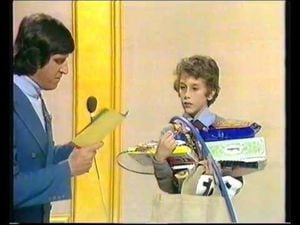Yes its back, Crackerjack!
It's Friday, it's five-to-five, and it's Crackerjack!

For a generation of youngsters, those words were not simply the introduction of a television programme. They marked the start of the weekend. The drudgery of school, and the earnest Blue Peter appeals were over for the week. It was time for a bit of madcap mayhem.
And it's coming back. The BBC has announced the hit children's TV series is to return after a 35-year absence, this time presented by Black Country boy Mark Rhodes, and his sidekick Sam Nixon, who formed a popular double act after appearing on Pop Idol in 2003.
The news comes just days after it was mooted – again – that the Jersey-based detective series Bergerac could be set for a comeback. It seems we can't get enough of nostalgia these days.
In its heyday, Crackerjack! pulled in 8.5 million viewers, and any child lucky enough to have won an engraved Crackerjack! pencil would certainly have bragging rights in the school playground. The show also helped establish a host of up-and-coming comedians, with Leslie Crowther, Little & Large, Don Maclean and Stu Francis all carving out successful careers after appearing on the show.
Brummie funnyman Maclean, best remembered for his double act with Peter Glaze in the 1970s, says its Friday teatime slot was crucial to its popularity as family viewing.
"The working week would finish early on a Friday afternoon, so mums and dads and children would watch it all together," he says.
"I interviewed the Osmonds several times, and they often said they sold more records by an appearance on Crackerjack! than an appearance on Top of the Pops."
There were five main presenters during Crackerjack!'s 29-year run, beginning with Eamonn Andrews in 1955, and ending with Stu Francis in 1984. It was filmed in front of a live audience of children on a Tuesday, and in its early years it was screened on Thursday. But the familiar Friday format came when Leslie Crowther took over in 1964, and the show never looked back. Just as different generations will define themselves by which Doctor Who they grew up with, the same could be said about Crackerjack! presenters. While the Crowther years were rooted in the the music hall tradition, it could probably be argued that the show hit its peak in the mid 1970s when DJ Ed 'Stewpot' Stewart replaced Michael Aspel as the frontman. While Stewart, previously best known for presenting Junior Choice on Radio One, gave the show a bit of street cred with the older children, the Glaze-Maclean double act made sure there was still plenty of mirth. The duo's Laurel and Hardy style silent comedy skits would reduce youngsters to hysterics, with Maclean usually playing the accident -prone buffoon to Glaze's exasperated straight man.
The Double or Drop quiz, where children were handed a prize for every question they answered correctly, or a cabbage for each one they got wrong, was another staple of the show, demonstrating that general knowledge could be fun. And the show usually finished with a Morecambe & Wise style finale, where the cast would perform a comedy play, adapting the pop songs of the day to fit in with the script.
The big question, though, will be whether simple slapstick fun and pop music will still appeal to the digital generation. Ratings flagged towards the end of the show's run, when Ed Stewart was replaced by Stu Francis, and Don and Pete made way for The Krankies, and there was perhaps a feeling at this time that the show had run its course.
And it seems hard to imagine a generation raised on their smartphones will get so excited about the Crackerjack! pencil.
On the other hand, shows such as Ant and Dec's Saturday Night Takeaway – which is not a million miles away from the old Crackerjack! format – shows there is still a huge market for traditional light entertainment. Since their Pop Idol days, Mark Rhodes and Sam Nixon have carved out a successful career as a children's TV double act, and if they can make their own mark on the show, without relying too heavily on the past, the BBC might be on to something.
Reviving a much-loved show from years gone by is always fraught with danger, as efforts to bring back Crossroads, Minder and What's My Line? have all shown over the years.
On the other hand, if the BBC can pull it off, there will be no shortage of adults tuning in to join their children. If that means dragging children away from their tablets, and sharing a bit of old-fashioned fun with the family, that will be no bad thing.
Next stop Magpie?





